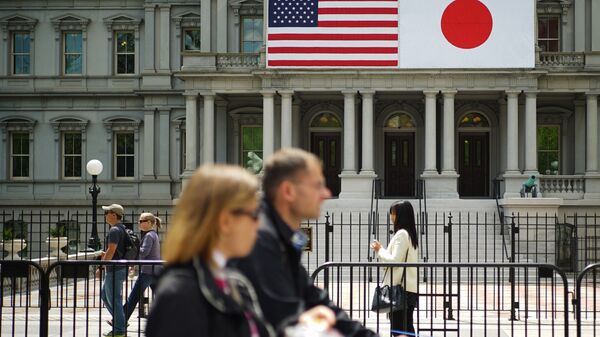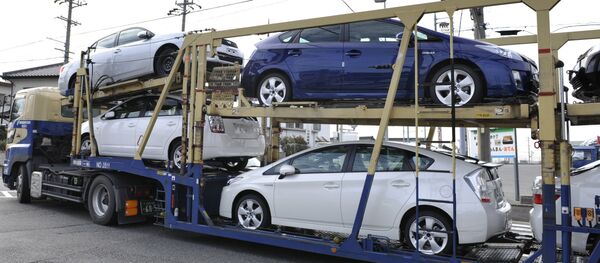Kristian Rouz — The Japanese government is considering striking a bilateral trade deal with the US in order to ensure the uninterrupted export of its manufactured goods. However, the deal is poised to be a compromise agreement, and Japan might have to ramp up its imports of US products.
While some say Tokyo could take in more American soybeans and the like, others speculate Japan could increase its imports of American energy — as the looming disruptions in supplies from the Middle East could drive up fuel prices in the island nation.
READ MORE: Japan to Suspend Iran Oil Imports Over US Pressure — Reports
Japan's influential newspaper, Nikkei, wrote Saturday that the Japanese government sees ‘cars for soybeans' as a good blueprint for a future trade deal with the US. Government officials say they could lower the tariffs on US agricultural products in order to avoid higher US tariffs on cars.
The benefits of such a deal would equal to those under the previously proposed Trans-Pacific Partnership, which the Trump administration withdrew from last year.
Some experts say Japan is interested in maintaining its current levels of auto exports to the US to support its trade-reliant economy. In this light, US auto tariffs are deemed absolutely undesirable by the Japanese government.
"But this is something Japan must absolutely avoid," former Finance Ministry official Toshiro Muto said. "I can't think of any sector in Japan that can replace its giant auto industry as a key driver of growth."
The Trump administration recently proposed a 25-percent tariff on the import of motor vehicles and auto parts from Japan, which could increase prices and maintenance costs in the US. This would level the playing field for US automakers, and reduce US trade imbalances with Japan.
A possible ‘cars for soybeans' deal, on the other hand, would allow Japan to maintain its trade revenues, whilst also boosting US exports to Japan, and help American farmers offset the possible downside effects of trade tensions with Mainland China. such a deal would also reduce US trade deficit with Japan.
However, more recently, a new factor has emerged on the table — oil.
According to the Petroleum Association of Japan (PAJ), Japanese refiners are weighing a wider range of substitute options. Imports of US crude and liquefied natural gas (LNG) could be one of them — and part of the future US-Japanese trade accord.
"It is my view that each firm is taking the same stance and temporarily suspending (Iran imports) and watching the situation carefully," PAJ President Takashi Tsukioka said.
Final shipments of Iranian oil are expected to reach Japan by mid-October, Tsukioka said.
READ MORE: Japan, N Korea Held Secret Talks in Vietnam Without Informing US — Reports
Recently, South Korea ramped up its imports of US oil — and Japan is widely expected to follow suit.
"Our US crude oil purchase is purely because of its price advantage," Kim Woo-Kyung of SK Innovation, the owner of South Korea's biggest oil refiner SK Energy, said.
In this light, a heatedly-debated trade deal between Japan and the US could become a multi-dimensional agreement, which would include several sectors of both economies. Automotive and agricultural mostly pertain to the US consumer market and Japan's food security, but energy imports are vital for the normal functioning of the Japanese economy.
Meanwhile, US President Donald Trump expressed his dissatisfaction with Japan's $69-billion trade surplus with the US, of which some 60 percent are represented by cars, which many argue are more affordable, reliable, and economical than their American counterparts.
"I don't think there's any reason not to take (US President Trump) seriously," Tobias Harris of Teneo Intelligence said.
After all, the prospect of the American energy sector expanding into the Japanese market could mean massive investment in West Coast oil and port infrastructure — not to mention additional trade revenues for the US.



